Are you a disabled veteran who cannot maintain substantially gainful employment due to your service-connected disabilities? If so, you may be eligible for Total Disability based on Individual Unemployability (TDIU) benefits from the Department of Veterans Affairs (VA). TDIU claims can be complex and require significant documentation.
This guide will help you understand what is required to win your TDIU claim. Read on to learn more.
What is Total Disability Based on Individual Unemployability (TDIU)?
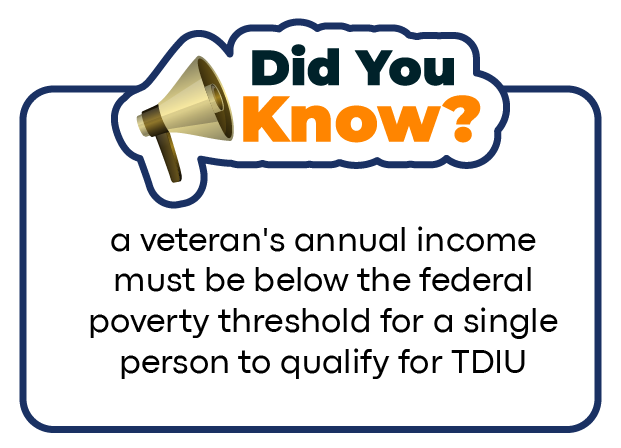
Total disability based on individual unemployability (TDIU) is a VA benefit program wherein eligible veterans can receive monthly compensation at the 100-percent rate, even if their combined schedular rating doesn’t reach that percentage.
TDIU benefits are available to disabled veterans with service-connected conditions making it impossible for them to maintain substantially gainful employment. This means that the veteran’s annual income must be below the federal poverty threshold for a single person to qualify.
Eligibility requirements for TDIU
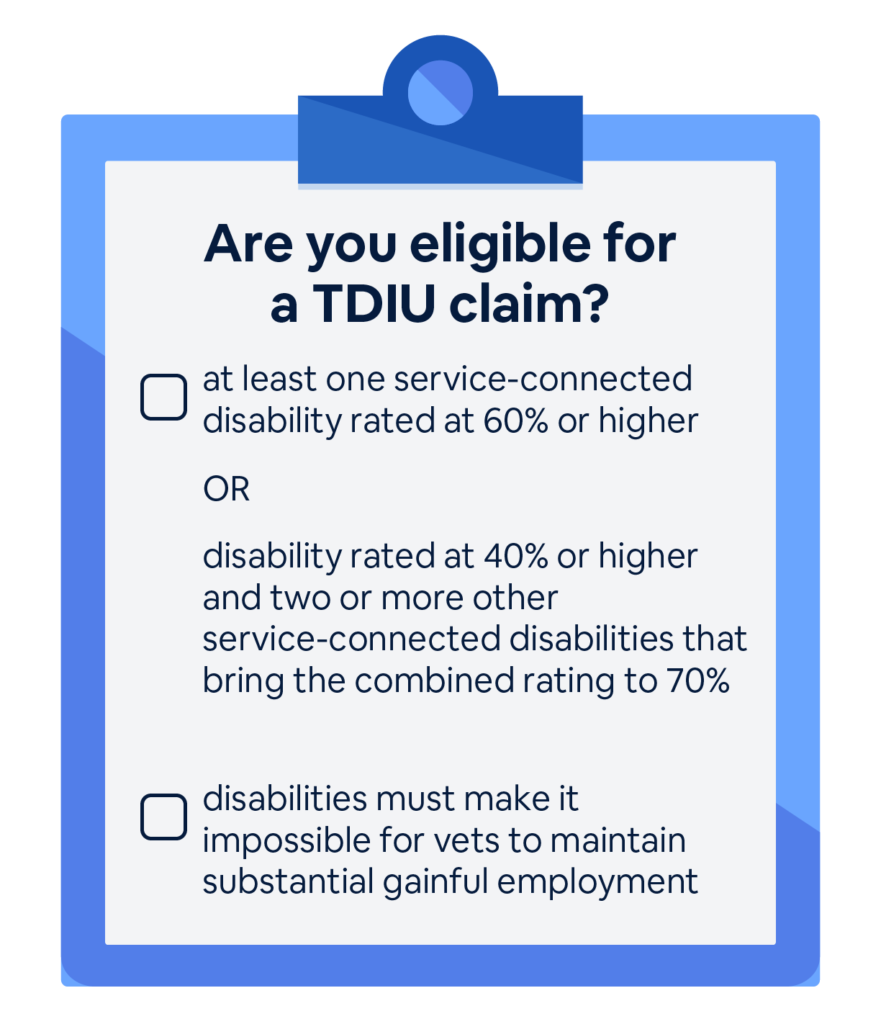
To be eligible for TDIU, veterans must have at least one service-connected disability rated at 60% or higher. Additionally, a veteran may qualify if they have a disability rated at 40% or higher and two or more other service-connected disabilities that bring the combined rating to 70%.
These disabilities must make it impossible for vets to maintain substantial gainful employment. This refers to a job that pays above the poverty level for a single person. If veterans cannot obtain or maintain such employment because of their service-connected disabilities, they may be eligible for TDIU benefits.
It’s important to note that this does not mean veterans must be completely unemployed. If they cannot obtain or maintain a job that pays above the poverty level, they may qualify for TDIU benefits.
How to Apply for TDIU
To apply for TDIU benefits, veterans must complete and submit VA Form 21-8940: Veteran’s Application for Increased Compensation Based on Unemployability. This form is designed to provide additional information to the VA about the veteran’s background, such as educational level and employment history.
It is important to note that TDIU is not a separate claim but rather part of an underlying claim or appeal for an increased rating. This was recently confirmed in Harper v. Wilkie, where the court held that TDIU is part and parcel of an increased rating claim whenever raised by the record or explicitly requested by the veteran.
When veterans make a case for TDIU, they need evidence that their service-connected conditions contribute to or cause their inability to maintain substantially gainful employment. This means that even if the veteran has not submitted VA Form 21-8940, TDIU could still be raised through other ways, such as Vocational Rehabilitation and Employment benefits proving disability.
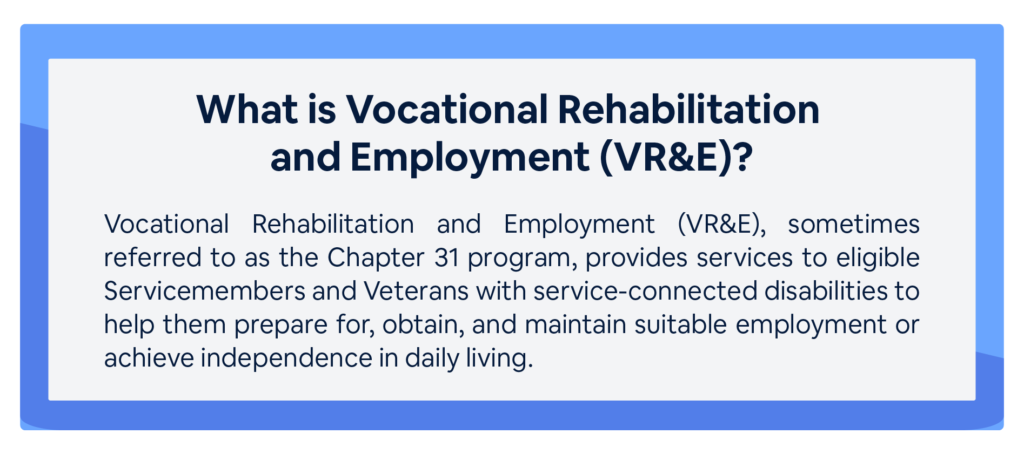
However, veterans must submit the form when they explicitly apply for TDIU or when VA requests it. In some cases, VA can deny a veteran’s claim if they do not submit this form. It is also important to note that even though a claim for TDIU is part of an increased rating claim, the VA may treat it as its claim, which could lead to a wrong effective date for the benefits awarded. In this case, veterans can appeal and ensure their effective date is correct. According to VA policy, the effective date should be linked to an open increased rating claim and when the record raised it.
What is Unemployable vs. Unemployed?
Being unemployable and unemployed are two distinct terms when determining a veteran’s entitlement to a TDIU rating under 38 CFR 4.16. A veteran may have experienced unemployment due to economic factors, work performance issues, or other reasons that do not necessarily affect their ability to secure and maintain substantially gainful employment due to a service-connected disability.
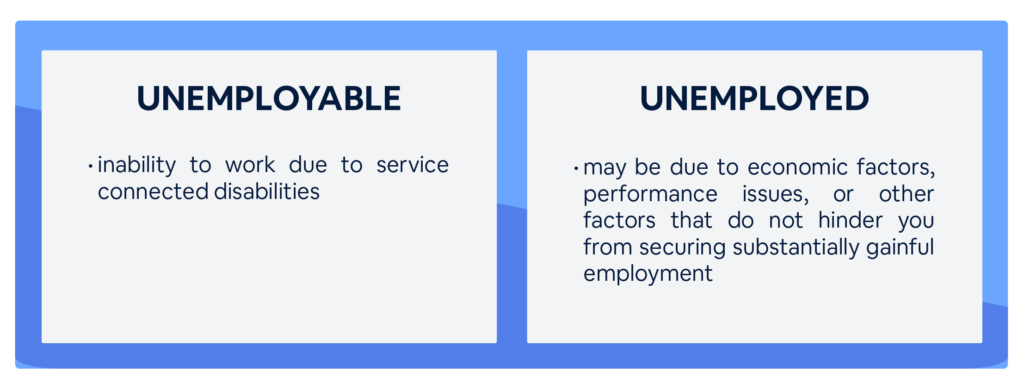
However, a veteran may still be unemployed from one job due to their service-connected condition and yet remain capable of pursuing another substantially gainful occupation. According to the VA, substantially gainful employment is defined as competitive (non-protected) employment with earnings exceeding the poverty threshold set by the U.S. Department of Commerce, U.S. Census Bureau, established for one person.
The VA recognizes that disabled veterans may be unable to secure and maintain employment due to their service-connected disabilities and thus have the option to apply for TDIU benefits through VA regional offices. With a successful claim for total disability based on individual unemployability, disabled veterans may receive the same monthly payment as those with a higher combined rating for their service-connected conditions.
Veterans need to understand the difference between unemployment and unemployment, as only those considered unemployable due to their service-connected disabilities may be eligible for TDIU benefits.

What is a VA Form 21-8940?
VA Form 21-8940, also known as Veteran’s Application for Increased Compensation Based on Unemployability, is used by veterans applying for an increased rating based on unemployability. The VA usually requests this form when a veteran’s claim is being considered for TDIU benefits. Still, it can also be submitted proactively to increase the chances of a successful claim.
The form requires information about the veteran’s current employment status, other work history, and any other conditions that may hinder the veteran’s ability to maintain substantially gainful employment. This form is usually evaluated by veterans’ service representatives and rating authorities to determine whether the veteran is eligible for a TDIU rating. The information on this form helps VA understand how well a veteran’s service-connected disabilities impact their ability to work and provide for themselves.
VA Considerations When Deciding TDIU
When adjudicating TDIU claims, VA must consider a veteran’s limitations, background, vocational history, and other relevant factors to accurately assess the veteran’s ability to secure and follow substantially gainful employment. VA must consider not just the veteran’s service-connected disabilities but also their physical and mental abilities, skills, and training to determine if they can perform the activities required in a given job. This evidence is usually gathered from the veteran’s statements, buddy statements, and Compensation & Pension (C&P) examinations.

It may be helpful for veterans to provide vocational and medical evidence to prove the case. While medical professionals can talk about veterans’ actual limitations, they cannot accurately assess how they may affect their ability to work. Vocational evidence becomes a critical part of this assessment to provide an accurate picture of the veteran’s capacity to work.
VA should also consider the economic aspects when making a TDIU determination; this includes looking at veterans’ ability to earn more than a marginal income. With all these factors taken into consideration, VA Regional Offices can make an accurate determination that can help disabled veterans receive the VA disability benefits and TDIU benefits they are entitled to.
Therefore, when claiming TDIU, veterans need to provide evidence of their service-connected conditions and their physical and mental abilities, skills, and training to demonstrate their capacity to maintain substantially gainful employment. This evidence and accurate medical and vocational assessments can help disabled veterans receive the VA disability benefits they need and deserve.

Are TDIU Benefits Permanent?
When it comes to TDIU benefits, a few factors come into play when assessing the permanent nature of such benefits. One indicator is whether the VA decision granting TDIU includes entitlement to Dependents Educational Assistance (DEA) benefits. This serves as an indication that the TDIU grant is permanent.
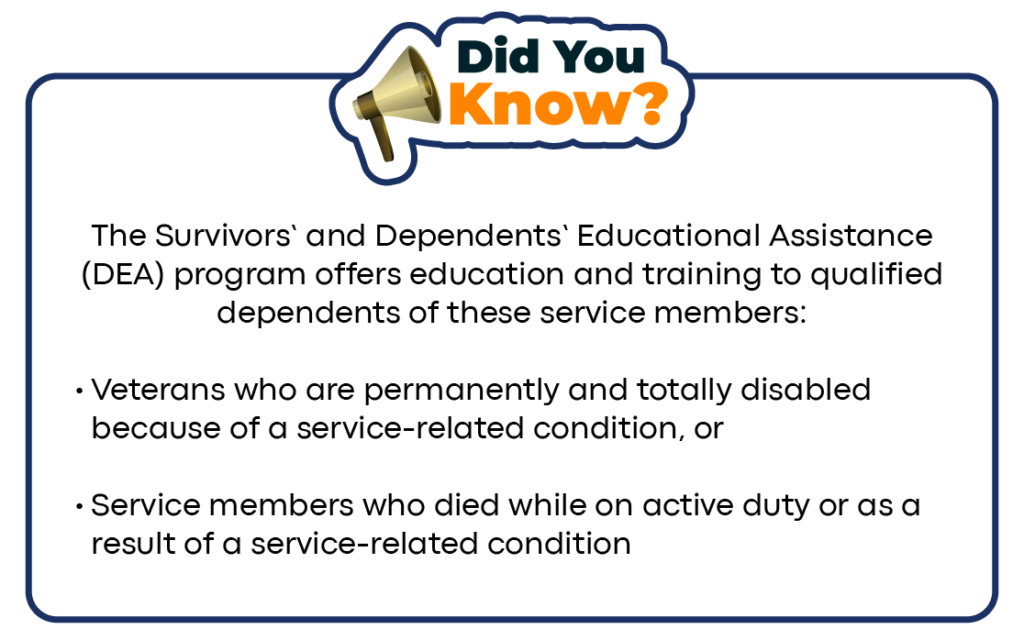
In the past, VA sent out an annual form (VA Form 21-4140) as an employment verification form. Veterans were required to complete this form and indicate to VA if they had worked at any point during the last 12 months. If not, TDIU benefits would continue; however, if veterans worked for 12 consecutive months, TDIU benefits could be discontinued.
Recently, VA has replaced this form with income verification through the Social Security Administration. This involves assessing whether there is a reasonable likelihood that the veteran will be able to return to substantially gainful employment in the foreseeable future. If there is evidence of improvement in the veteran’s conditions or they can return to work, then VA can re-examine the TDIU grant and reduce benefits accordingly.
Overall, TDIU benefits require a detailed assessment of the veteran’s physical and mental abilities, skills, training, and economic factors to accurately determine their capacity to maintain substantially gainful employment. Only with this information can disabled veterans receive the VA disability and TDIU benefits they are entitled.
Need Help with Filing a VA Disability Claim
Filing a VA disability claim can be intimidating, especially for disabled veterans. Fortunately, Vetclaim is here to help. Our Vet claim coaches are passionate about helping disabled veterans receive the compensation and care they deserve. With years of experience handling TDIU and other VA disability claims, our Vet Claim Coaches will work with you every step, from filing to appealing. Contact us today to learn how we can help you get the VA TDIU benefits you deserve.


